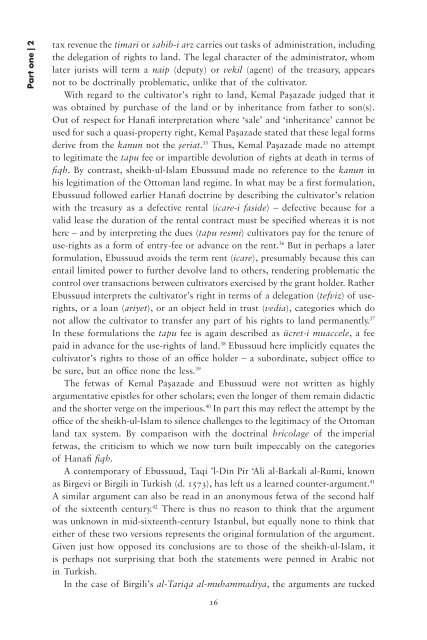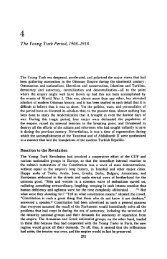Governing property, making the modern state - PSI424
Governing property, making the modern state - PSI424
Governing property, making the modern state - PSI424
You also want an ePaper? Increase the reach of your titles
YUMPU automatically turns print PDFs into web optimized ePapers that Google loves.
Part one | 2<br />
tax revenue <strong>the</strong> timari or sahib-i arz carries out tasks of administration, including<br />
<strong>the</strong> delegation of rights to land. The legal character of <strong>the</strong> administrator, whom<br />
later jurists will term a naip (deputy) or vekil (agent) of <strong>the</strong> treasury, appears<br />
not to be doctrinally problematic, unlike that of <strong>the</strong> cultivator.<br />
With regard to <strong>the</strong> cultivator’s right to land, Kemal Paşazade judged that it<br />
was obtained by purchase of <strong>the</strong> land or by inheritance from fa<strong>the</strong>r to son(s).<br />
Out of respect for Hanafi interpretation where ‘sale’ and ‘inheritance’ cannot be<br />
used for such a quasi-<strong>property</strong> right, Kemal Paşazade <strong>state</strong>d that <strong>the</strong>se legal forms<br />
derive from <strong>the</strong> kanun not <strong>the</strong> şeriat. 35 Thus, Kemal Paşazade made no attempt<br />
to legitimate <strong>the</strong> tapu fee or impartible devolution of rights at death in terms of<br />
fiqh. By contrast, sheikh-ul-Islam Ebussuud made no reference to <strong>the</strong> kanun in<br />
his legitimation of <strong>the</strong> Ottoman land regime. In what may be a first formulation,<br />
Ebussuud followed earlier Hanafi doctrine by describing <strong>the</strong> cultivator’s relation<br />
with <strong>the</strong> treasury as a defective rental (icare-i faside) – defective because for a<br />
valid lease <strong>the</strong> duration of <strong>the</strong> rental contract must be specified whereas it is not<br />
here – and by interpreting <strong>the</strong> dues (tapu resmi) cultivators pay for <strong>the</strong> tenure of<br />
use-rights as a form of entry-fee or advance on <strong>the</strong> rent. 36 But in perhaps a later<br />
formulation, Ebussuud avoids <strong>the</strong> term rent (icare), presumably because this can<br />
entail limited power to fur<strong>the</strong>r devolve land to o<strong>the</strong>rs, rendering problematic <strong>the</strong><br />
control over transactions between cultivators exercised by <strong>the</strong> grant holder. Ra<strong>the</strong>r<br />
Ebussuud interprets <strong>the</strong> cultivator’s right in terms of a delegation (tefviz) of userights,<br />
or a loan (ariyet), or an object held in trust (vedia), categories which do<br />
not allow <strong>the</strong> cultivator to transfer any part of his rights to land permanently. 37<br />
In <strong>the</strong>se formulations <strong>the</strong> tapu fee is again described as ücret-i muaccele, a fee<br />
paid in advance for <strong>the</strong> use-rights of land. 38 Ebussuud here implicitly equates <strong>the</strong><br />
cultivator’s rights to those of an office holder – a subordinate, subject office to<br />
be sure, but an office none <strong>the</strong> less. 39<br />
The fetwas of Kemal Paşazade and Ebussuud were not written as highly<br />
argumentative epistles for o<strong>the</strong>r scholars; even <strong>the</strong> longer of <strong>the</strong>m remain didactic<br />
and <strong>the</strong> shorter verge on <strong>the</strong> imperious. 40 In part this may reflect <strong>the</strong> attempt by <strong>the</strong><br />
office of <strong>the</strong> sheikh-ul-Islam to silence challenges to <strong>the</strong> legitimacy of <strong>the</strong> Ottoman<br />
land tax system. By comparison with <strong>the</strong> doctrinal bricolage of <strong>the</strong> imperial<br />
fetwas, <strong>the</strong> criticism to which we now turn built impeccably on <strong>the</strong> categories<br />
of Hanafi fiqh.<br />
A contemporary of Ebussuud, Taqi ’l-Din Pir ‘Ali al-Barkali al-Rumi, known<br />
as Birgevi or Birgili in Turkish (d. 1573), has left us a learned counter-argument. 41<br />
A similar argument can also be read in an anonymous fetwa of <strong>the</strong> second half<br />
of <strong>the</strong> sixteenth century. 42 There is thus no reason to think that <strong>the</strong> argument<br />
was unknown in mid-sixteenth-century Istanbul, but equally none to think that<br />
ei<strong>the</strong>r of <strong>the</strong>se two versions represents <strong>the</strong> original formulation of <strong>the</strong> argument.<br />
Given just how opposed its conclusions are to those of <strong>the</strong> sheikh-ul-Islam, it<br />
is perhaps not surprising that both <strong>the</strong> <strong>state</strong>ments were penned in Arabic not<br />
in Turkish.<br />
In <strong>the</strong> case of Birgili’s al-Tariqa al-muhammadiya, <strong>the</strong> arguments are tucked<br />
16












